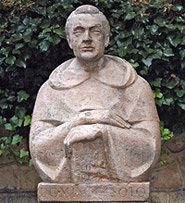| Profile | Major Works | Resources |
Domingo de Soto, 1494-1560.

16th C. Spanish theologian of the Salamanca School.
Dominican theologian, born in Segovia and trained in Alcala and Paris. Domingo de Soto was a professor of theology at the University of Salamanca from 1532, contemporaneously with Francisco de Vitoria (whom he first met in Paris). Highly influential in his own right, De Soto became a confessor of Holy Roman Emperor Charles V and, in 1545, was appointed emperor's representative at the Council of Trent.
De Soto's economic reflections are found principally in his De Justicia et jure (1552), taken down from his lectures at Salamanca. Although De Soto's reasoning is frequently different from the Scholastic doctrine, his conclusions are more timid and generally in line with the conventional views. In this, de Soto was frequently at odds with his more liberal colleague Navarrus. De Soto was less enamored with markets, and embraced State price controls not only as a practicality, but as an ideal. He spent some time pondering the Great Inflation, noting in particular the depressing influence the influx of Peruvian silver on the value of Spanish coin, and on its exchange rate abroad, thus articulating an early version of the purchasing power parity theory.
While generally backing the Church ban on usury, sometimes quite vigorously, Domingo de Soto nonetheless sought exceptions and helped undermine its basis by dismissing earlier interpretations and finding usury only contrary to natural law, not contrary to theology. He defended the price differential in usury as compatible with "just price" and was keen on personal annuities, but adamant about holding the line elsewhere.
|
Major Works of Domingo de Soto
|
|
HET
|
|
Resources on Domingo de Soto
|
All rights reserved, Gonšalo L. Fonseca
